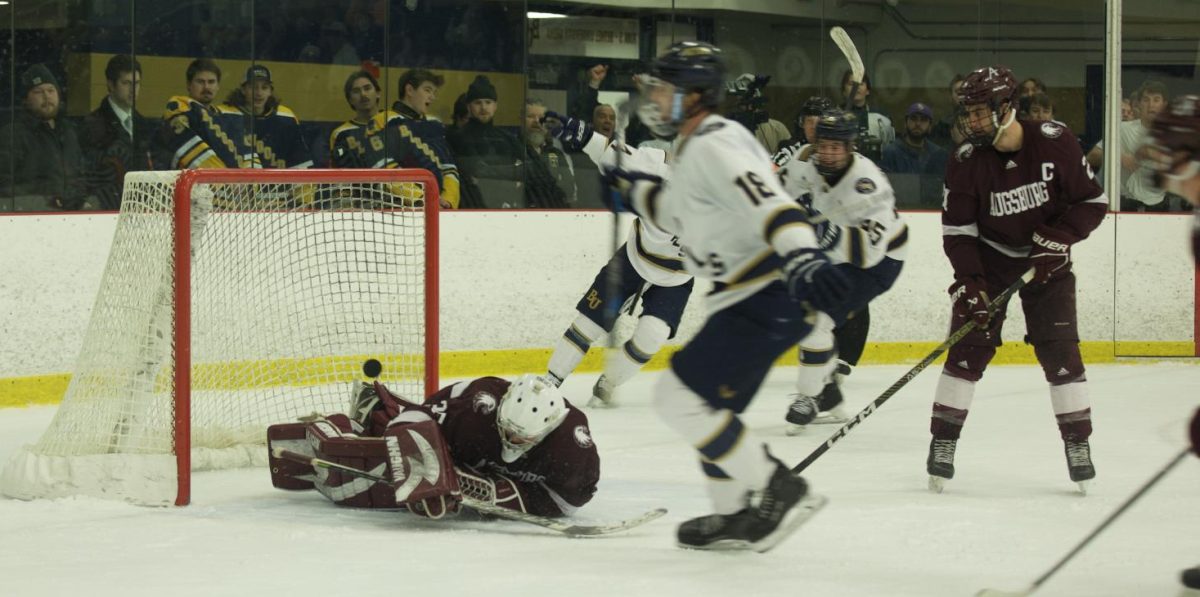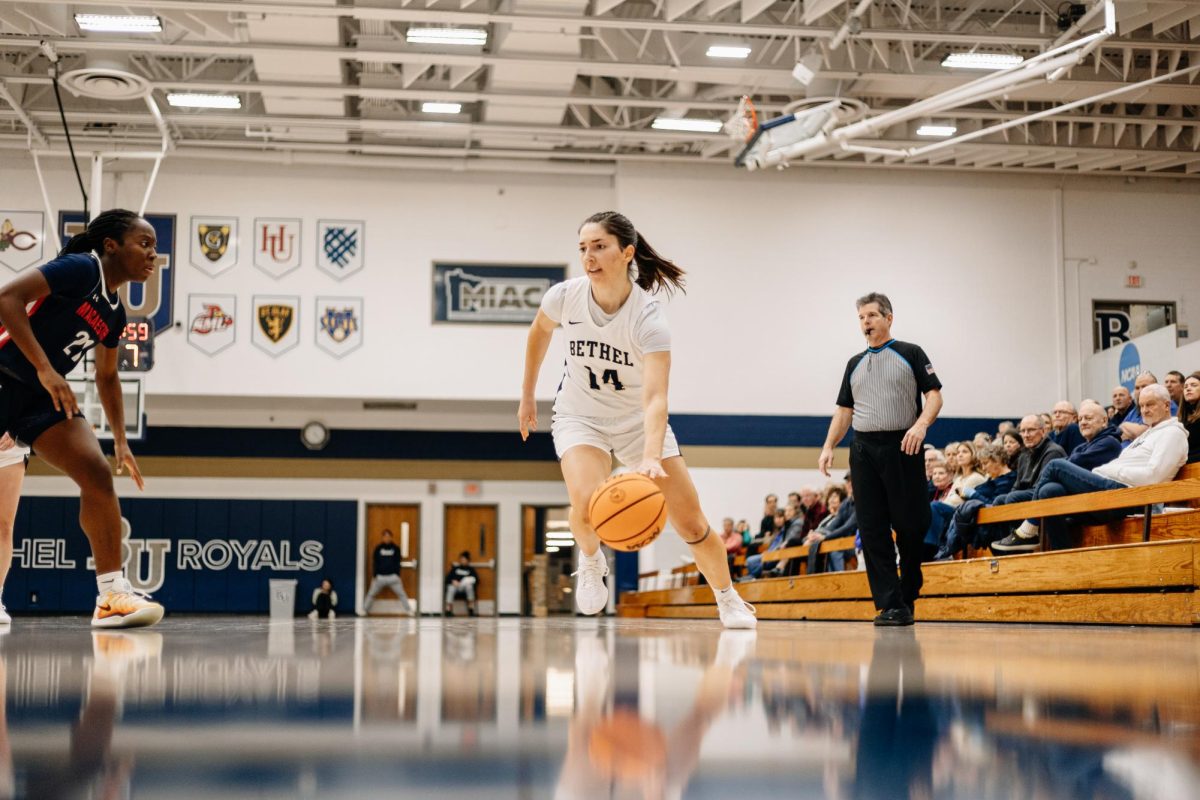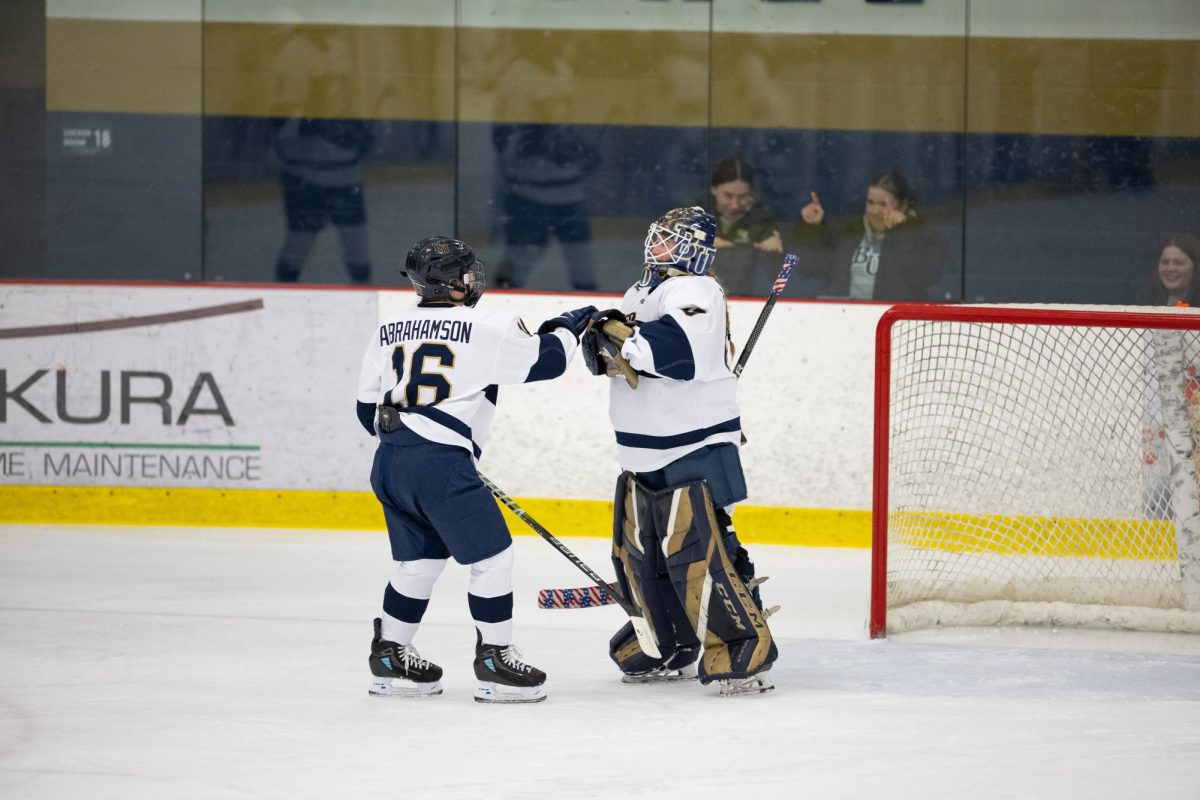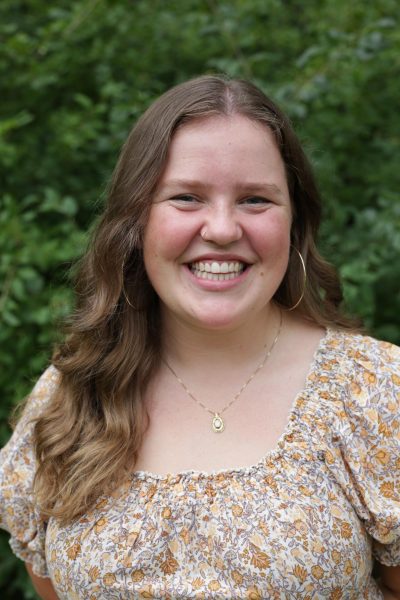Levi Case woke up to sirens.
The rapid ascending and descending blare jarred him from sleep Oct. 7 a little after 8 a.m. Back home, a noise like this might signal a tornado. But here in Jerusalem, the signal meant something different: air raid.
It was Shabbat, the Jewish day of rest, so Case knew it wasn’t a drill. Having been trained on emergency protocol upon arrival, Case knew to head to the basement of Jerusalem University College’s academic building. He had 90 seconds to get to a protected area. Although the Iron Dome, Israel’s air defense system, intercepts most missiles, Case and the other residents of Jerusalem had to stay in the protected area for 10 minutes in case any debris from the interception were to fall.
A junior at Bethel studying Biblical and theological studies, Case expected his semester abroad at Israel’s JUC to be a chance to walk where Jesus walked, eat warm, seasoned falafel and study the Bible on location. Taking cover in a bomb shelter was not on that list of expectations.
On Oct. 7, 2023 the Palestinian militant group Hamas launched thousands of rockets toward Israel and breached through the perimeter fence of Gaza at multiple locations, entering into Israeli towns and killing and capturing Israeli forces and civilians. The Israeli military declared “a state of war alert” and began striking targets in the Gaza Strip, including residential buildings and health care facilities. Since then, thousands of people have been killed and more than one million have been displaced, as parts of Gaza have been reduced to rubble and Israel has begun to launch a larger offensive to eradicate Hamas completely.
This outbreak of violence is one in a long string of conflict. People often disagree on where to start the history. Start in 1900 under Ottoman rule and the story might look more pro-Palestine. Start in 1948 with the creation of the Israeli state and the story might look more pro-Israel. Or go back millenia to when Jesus walked the streets of Jerusalem. Regardless, the story is complicated.
Before studying at JUC, Case did not have much knowledge about the political or theological conflict. Living in Jerusalem became a crash course to this region’s history. While this was all new to Case, it was not new to his university.
“The professors and faculty of JUC were kind of in this mentality that this is normal and this is business as usual,” Case said.
Case’s Hebrew professor also serves in the Israeli Defense Force. He came back from the front lines to teach a Hebrew lesson and an Armaic lesson. As soon as class was over, he went back to war.
JUC has been around since 1957. It was a school during the 1967 Six-Day War when Israel occupied the West Bank. And in 1974 when the Palestinian Liberation Organization was recognized by the UN as the sole legitimate representative of the Palestinian people. And in 2008 when Israel broadened sanctions and completely sealed off the Gaza Strip.
JUC Chief of Staff Nicole Ottavi explained that before it became a place of learning, JUC’s buildings had been an Israeli military outpost.
“This is not our first experience with conflict and violence,” Ottavi said. “And so we’re committed to maintaining a presence in Jerusalem and maintaining courses for as long as it’s safe and appropriate to do so.”
For Case, JUC no longer felt safe. He made a 40-hour trip across four flights and three layovers back to his hometown of Rogers, Minnesota. He wasn’t required to come home immediately after the attacks, but ultimately decided to after encouragement from Bethel, his family and friends.
“I felt safe in Jerusalem, but I decided: I probably shouldn’t be here because so many people are gonna be worried nonstop,” Case said.
He is determined to return to Jerusalem. In the seven weeks he was there, Case loved to explore the Old City and walk through each quarter: Armenian, Christian, Jewish and Muslim. He enjoyed the sounds of children running by, scents wafting from spice sellers and souvenir shops selling trinkets to tourists.
Now he takes his classes online, often at Bethel, and is hoping to move back on campus. But his classes don’t have the same weight that they did in Jerusalem, especially JUC’s hallmark class: Physical Settings of the Bible.
Instead of walking through the wilderness where Jesus was tempted and being baptized in the Jordan River, Case now attends online lectures and virtual field studies to see these places. It’s just not the same.
“The reason JUC exists is because of where we exist,” Ottavi said. “And as much as we can make adjustments to the courses, there is something lost about not being here in the land.”
***
Case originally heard about JUC through his professor and adviser Gary Long, who taught at JUC for five years in the 1990s as the chair of the Semitic Languages department.
He describes his time living and working in the region as complex, vibrant and, at times, disastrous.
There were positives: taking his family for Sunday morning picnics to read Bible stories from the region. Reimagining scenes ranging from Samson and the temple pillars to David and Goliath. There were also negatives such as worrying whether his son had been caught up in a terrorist bombing of a bus on his way home. While living in Jerusalem, Long learned to know the percussive differences of the sound of a terrorist’s bomb, quarrying explosions to mine limestone and sonic booms from Israeli jets overhead.
Despite having left the region 24 years ago, seeing the current devastation is painful. Take the town of Ashkelon, for example. Just outside of the Gaza Strip in Israel, the people who live there only have 15 seconds of preparation before a bomb drops. That town was Long’s go-to beach. It was where his daughter first saw the sea. And now it bears the scars of Hamas rocket fire.
The scars upon the land and people of this region run deep, and they’re felt by others within the Bethel community too.
History professor Amy Poppinga has been horrified by the violence of the past two months. As Bethel’s expert on Islamic studies with a Ph.D. in Islamic Studies and Christian-Muslim Relations, one of Poppinga’s core classes is Modern Middle East. Her students spend five weeks unpacking the Israeli-Palestinian conflict through readings, documentaries and classroom discussion. And sometimes she still feels like it only scratches the surface.
Poppinga says the region looks different now than it did 120 years ago. At that time, the people in the area now known as Israel and Palestine thought of themselves as Ottoman subjects under the Ottoman empire. Arabs, Jews, Christians, Muslims, Palestinians — all Ottomans.
As Jews in Europe faced extreme anti-semitism, the idea of Zionism grew, which was a movement for the reestablishment of a Jewish state in the Holy Land. Many Jews began to immigrate to the region of the Ottoman Empire that is now Israel and Palestine, but they wanted to remain separate from the people who were already living there.
After the Ottoman Empire fell in World War I to the Allies, rule in Palestine was administered under a League of Nations Mandate until 1948. In 1947 the UN had voted to partition the area into two states — one Jewish, one Arab. Neither side accepted the partition, and violence ultimately escalated until the surrounding Arab countries invaded Israel after it declared independence May 1948. The war ended in a 1949 armistice agreement that left Israel with considerably more territory than the original partition plan had given.
From there, Poppinga continues to weave the story of immigration, failed peace talks and people searching for a better life. It is not purely a religious conflict, but one steeped in ethnic, national, political, economic and cultural tensions. It is not black and white, good and bad.
“I think we miss something then, when as Christians we oversimplify,” Poppinga said.
She often finds it is easier to start with the big picture when looking at the goals of many people in the region. The ultimate goal is to make sure that all of God’s children — both Israelis and Palestinians — are thriving. That their kids can go to school, that their paycheck can get cashed, that they have access to health care. To make sure they have access to not just life, but to human flourishing.
For Poppinga, violence is not bringing the world any closer to this goal. It will not make for a safer Israel, and it will not make for a safer Palestine. She cannot reconcile it and sees it as a huge setback.
“I will not stand behind anything that suggests that [the violence] is somehow justified or it is retribution,” Poppinga said. “As a Christian, no, just no.”
Long echoes Poppinga’s sentiments for peace. He is particularly troubled by the loss of life for civilians.
“I wish, particularly for Christ’s followers, when looking at fellow non-combatants, [that they] could truly want to live out, not just say, but live out: I want to try to find ways to treat the neighbor, my fellow human, as I wish to be treated,” Long said.
Through this time of inner struggle, Long continues to teach Reading the Hebrew Bible and Cultural World of the Old Testament in the BTS department, often referencing the land a thousand years before its current conflict. Poppinga assigns readings in “Palestine and the Arab-Israeli Conflict,” a textbook that will soon need a new addition. Meanwhile, Case takes his classes online, often coming to Bethel to hang out with friends he hadn’t been expecting to see until December.
One day, he hopes to return to a peaceful Holy Land.



















